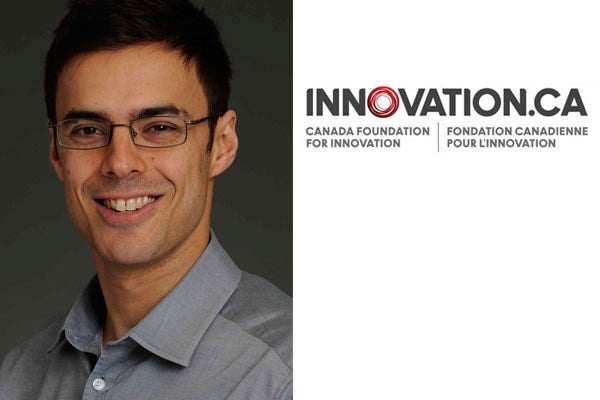
Using MRI to see mental illness in the brain
Published: April 16, 2014
What is going on in the brain of a person who has a severe mental illness, such as schizophrenia or bipolar disorder?
Aristotle Voineskos knows that treatment for these difficult conditions can’t be improved until a clearer understanding of the relationship between genetic factors and brain circuitry is achieved.
And to do that, Voineskos is making important progress in using Magnetic Resonance Imaging (MRI) techniques to map brain regions, connections and networks to learn how the brain is wired in health and in disease.
Voineskos has been awarded $287,849 to take his research further from the Canada Foundation for Innovation’s John R. Evans Leaders Fund (JELF). The fund, which has just awarded a total of $3,134,307 to U of T researchers, helps universities and hospitals acquire infrastructure for researchers to pursue cutting-edge work. JELF is named for Dr. John R. Evans, former U of T president.
“The combination of brain imaging and genetics can identify genetically susceptible brain circuitry common and unique to schizophrenia, bipolar disorder and psychotic depression, which can then be translated as treatment targets,” says Voineskos, a professor in the Department of Psychiatry at U of T and clinician-scientist at the Centre for Addiction and Mental health (CAMH), where he is the Koerner Scientist, and Head of the Kimel Family Translational Imaging-Genetics Laboratory.
In his work, Voineskos is also testing new treatments for cognitive dysfunction in these disorders, where he is using brain imaging to predict treatment response.
“There is a fundamental need to improve our understanding of existing treatments and develop new treatments for these disorders, especially related to cognitive deficits present in all disorders with psychosis and for which there are no treatments currently available.”
The other awarded U of T researchers are:
- Daphna Buchsbaum, Psychology, Computational approaches to Causal and Social Learning in Children and Animals, $100,000
- Sidhartha Goyal, Physics, Biophysics and Evolutionary Dynamics Laboratory, $359,660
- Patrick Gunning, UTM Chemical & Physical Sciences, Establishing a Knowledge Translation Centre for Identifying Inhibitors of Protein-Protein Interactions, $399,999
- Marc Laflamme, UTM Chemical & Physical Sciences, Exceptional Preservation in the Fossil Record, $51,626
- Philip Marsden, Medical Biophysics, Molecular pathology of cardiovascular disease: understanding how gene expression is perturbed in clinical samples, $376,643
- Daniel Moore, Kinesiology and Physical Education, High Performance Muscle Metabolism Suite, $180,830
- Deborah O’Connor, Nutritional Sciences, Optimizing Use of Human Milk for Preterm Infants, $50,000
- Beverley Orser, Physiology, Mechanisms of Anesthesia and Sleep, $89,732
- Agostino Pierro, Surgery, Advancing paediatric surgical techniques and childhood nutrition research by utilizing Isotope-Ratio Mass Spectrometry, $269,340
- Blake Richards, Towards an integrated picture of sensory learning in neural circuits, $150,000
- Ruth Ross, Pharmacology and Toxicology, Cannabinoid Drug Discovery, $192,762
- David Sinton, Mechanical & Industrial Engineering, From Fracture to Fluids to Combustion: Infrastructure to understand the implications of hydraulic fracturing, $250,000
- Greg Stanisz, Medical Biophysics, Monitoring Cancer Therapy Using Magnetic Resonance Imaging, $375,866
“The breadth of investigation among these projects is most impressive, as is the obvious impact this work will have on people’s lives,” said Professor Paul Young, vice-president, research and innovation at U of T. “Congratulations to the professors awarded through this program and we extend a deep thanks to the CFI for investing in U of T research.”
Paul Fraumeni is a writer with the office of the vice-president, research and innovation at the University of Toronto.



